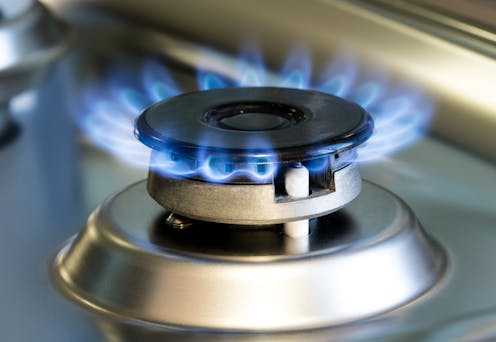how COVID helped them to surge – and why they won't go down any time soon
- Written by Bruce Morley, Lecturer in Economics, University of Bath

After months of volatility and concern, it was revealed that energy costs for the average household in the UK will increase by £693[1] this year. A steep rise, it came as wholesale gas prices jumped to about 300% higher[2] than at the beginning of 2021. These are historically high levels, never reached before in the UK.
And like so many issues facing society at the beginning of 2022, the influence of COVID is never far away. For although household energy bills include taxes and green levies, a major reason for the recent upward trajectory of gas prices is to do with changes in supply and demand.
Put simply, lockdowns and social restrictions over the last two years, when so many industries and events were forced to grind to a halt, led to a decrease in demand for energy[3]. And as demand fell, so did supply.
Then, as restrictions began to ease, demand jumped. In particular, the hospitality and travel sectors enjoyed a recovery[4] which contributed to rapidly increasing demand for energy.
But it is difficult to suddenly increase supply to meet a rise in demand, so prices went up.
The supply side of the gas market has become increasingly complex in recent years. This is partly due to international political factors, but also the drive to reduce reliance on fossil fuels and switch to more sustainable energy sources to meet climate change commitments.
This deliberate change, away from hydrocarbons in favour of sustainable sources like wind, biofuels and solar power, makes it harder for gas suppliers to predict market needs. In the third quarter of 2021 for example, the UK generated about 38% of its electricity from renewable sources[5], which was less than in 2020 due to substantially less wind.
Despite all of this, the majority of the UK’s electricity production still comes from fossil fuels[6]. And for at least the next ten years, gas will continue to be an essential part[7] of the UK’s energy policy. Now more than ever, that comes at a hefty price.
Until fairly recently, much of the UK’s supply came from domestic sources in the North Sea, but that has been in decline[8] since the turn of the century. Part of the reason for the decline is that the remaining UK gas and oil fields tend to be relatively small and dispersed around the North Sea.
So every time one source is exhausted, the producer needs to assess the case for starting up extraction from another source. But these sources are becoming less accessible, more expensive to extract from, and therefore less competitive.
As part of the response to climate change, there is now less enthusiasm[9] for offering the licenses to open new fields. But the problem is that the UK won’t become self-sufficient in renewable energy for many decades[10].
It now is heavily reliant on foreign sources, especially Norway, which has substantial gas reserves and is relatively near, which reduces transport costs.
But it is in the interests of gas exporters around the world to keep prices high, to maximise profits, so they have arguably been slow to increase production. (In the same way, Opec (the Organisation of the Petroleum Exporting Countries) has limited the supply of oil[12] to maintain price levels.)
A further supply problem involves the cap on gas prices[13] imposed by the UK government in 2019. This led to a number of providers collapsing when the wholesale gas price rose above the original cap, reducing competition in the industry. And although the capped price level has been renegotiated[14] this year to a higher level, it may still mean that prices charged by the suppliers are below the market rate.
All of this means it is unlikely that UK households will see a significant drop in energy prices any time soon, as demand continues to increase. Although it is dependent on international supply and demand, the current problems could continue for the foreseeable future.
Longer term though, there is a glimmer of hope from the government’s pledge to decarbonise electricity generation by 2035, with a rapid increase in renewable energy production. Current high prices for fossil fuels could and should act as a motivation to increase investment[15] in renewable sources, which would reduce the problems of supply at the same time as ensuring energy security and a gradual reduction in prices[16].
References
- ^ by £693 (www.theguardian.com)
- ^ 300% higher (www.ofgem.gov.uk)
- ^ demand for energy (www.iea.org)
- ^ enjoyed a recovery (www.ons.gov.uk)
- ^ from renewable sources (assets.publishing.service.gov.uk)
- ^ comes from fossil fuels (www.gov.uk)
- ^ an essential part (assets.publishing.service.gov.uk)
- ^ been in decline (www.energyvoice.com)
- ^ less enthusiasm (www.argusmedia.com)
- ^ many decades (www.bbc.co.uk)
- ^ Shutterstock/Lukasz Z (www.shutterstock.com)
- ^ supply of oil (www.economist.com)
- ^ cap on gas prices (www.ofgem.gov.uk)
- ^ has been renegotiated (www.ofgem.gov.uk)
- ^ motivation to increase investment (www.sciencedirect.com)
- ^ gradual reduction in prices (www.sciencedirect.com)







